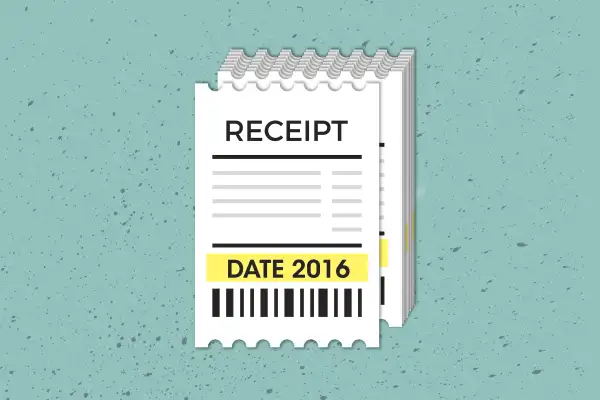Here's Exactly How Long You Should Keep Receipts, According to Experts

Money recently launched Dollar Scholar, a new personal finance newsletter written by a 27-year-old who’s still figuring it out: me.
Every week, I’ll talk to experts about a money question I have, whether that’s “Are online banks sketchy? or “How many credit cards do I need?” As I learn, I’ll share simple ways to improve your financial life… and post some funny memes.
This is (part of) the third issue, which came out last Wednesday. Check it out below, then subscribe to get future editions of Dollar Scholar the instant they drop.
With the launch of Dollar Scholar, I've been thinking about what sorts of things the adults in my life do and whether I should adopt those habits. Like, should I save receipts? I've been watching my grandma do it for years, but are there actual financial reasons I should be holding onto them?
To find out, I called Neal Stern, a CPA member of the American Institute of Certified Public Accountants’ Financial Literacy Commission. Stern told me that whenever I'm deciding how long to save a financial document, I need to think about:
- what the documents are needed for
- when in the future they might be required
- and whether it's going to be difficult to get a copy if I don't have the original
Specifically, he said I should keep tax returns and proof I filed them for three to seven years in case the IRS wants to review them. I should hold onto important papers like property deeds and investment records, too. But I can securely dispose of monthly bank statements, credit card statements and utility bills after reviewing them, because I could always go online and print additional copies if needed.
Another thing I don't need to worry about is keeping receipts for tax purposes. The standard deduction, which most people — myself included — take, doesn't require them. The laws around itemized deductions, which you do need documentation for, also changed for 2018.
"Not everything you might think of as supporting a tax return actually does," Stern adds.
Honestly, though, the vast majority of receipts I find myself saving are for unimportant things, like the $7.71 I recently spent on a Wendy's chicken nugget meal. While I don't need to keep these slips forever, Joanie Demer told me there is a reason not to immediately ball them up and try to shoot three-pointers into my garbage can.
Demer, the co-founder of The Krazy Coupon Lady, says she's often able to save money through apps and services that collect shopping behavior data. Basically, they want information on your habits that they can later resell to vendors, so they incentivize uploading pictures of your receipts. You can get rewards like points, coupons and cash back.
Demer personally uses Fetch and Ibotta most often; she says the latter is especially helpful at Walmart.
Life management expert Kalyn Brooke has a different system. As detailed in this blog post, she keeps a jar near the door for receipts "so they're not crammed into purses and wallets." (I can't imagine what she's talking about.)
On Fridays, she inputs all of the purchases into her spreadsheet of expenses. She then throws away everything she knows she's not going to return or use for business taxes. Remaining receipts get put in an accordion file she has organized by month.
This method helps Brooke keep track of where her money is going… and avoid letting receipts pile up.
"Before I started doing this, I was so overwhelmed with the paper clutter," she says. "When you have a system, you don't have to think about 'What am I going to do with this one?'"
The bottom line: The majority of my receipts can go in the garbage, and the rest should be filed away.
That said, Demer gave me a final tip: "Make sure you know what you're throwing away, because sometimes the paper they hand you [at checkout] is a coupon itself." Good looks.
